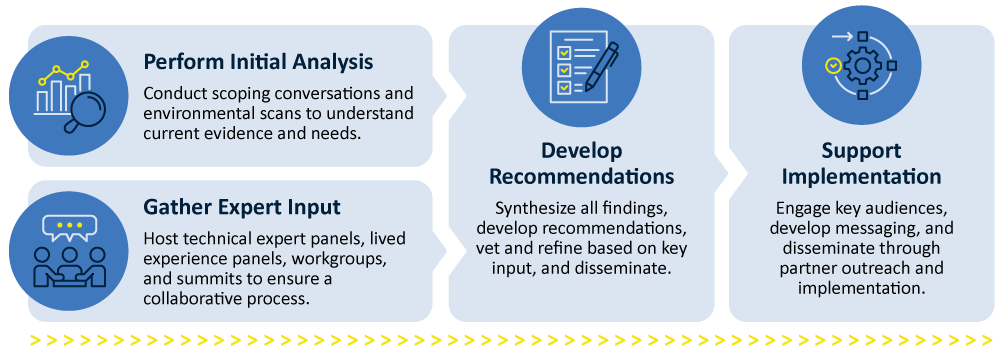About CECA
Mission
CECA is a convener of committed partners working to ensure access to contraception as part of a broader vision to achieve sexual and reproductive health equity (SRHE) for the U.S.
Vision
Our vision is that everyone can access person-centered, comprehensive contraceptive information, products, methods, and/or services that work best for them—when, how, and where they want it, free of barriers and bias. People who do not use contraception, or who are discontinuing contraception, should be free to make and realize that decision for any reason, without pressure, judgment, or coercion.
Goals
-

We foster collaboration
We cultivate, connect, and maintain a strong network of diverse partners to achieve shared goals.
-

We synthesize and develop evidence
We analyze current evidence, identify gaps, and chart a path forward to inform and advance equitable public policy and practice. We collaborate with partners to plan, carry out, and disseminate new research.
-

We create policy change and expand access to care
We leverage government policies and processes and set the stage for implementation efforts, with specific focus on expanding equitable access to contraception across the country.
-

We change the conversation
We ensure that efforts to expand access to contraception are grounded in the principles of reproductive justice. We host discussions, publish written work, and offer tailored guidance about how to integrate SRHE in contraceptive access work.
Our work is anchored in a commitment to sexual and reproductive health equity (SRHE).
SRHE means that systems ensure that all people, across the range of age, gender, race, and other intersectional identities, have what they need to attain their highest level of sexual and reproductive health. This includes self-determining and achieving their reproductive goals.
Government policy, healthcare systems, and other structures must value and support everyone fairly and justly.
Our Team
We are a team of sexual and reproductive health experts who have dedicated their careers to ensuring that people can access quality contraceptive care when, where, and how they need it. Meet our team,
Our Partners
CECA partner groups represent a broad range of settings and disciplines, from reproductive justice organizations, to care providers, to public health experts. Learn how and with whom we partner.
Our Approach
Our Story
CECA was initially founded to support the development of impactful, feasible, and sustainable recommendations for the federal executive branch to expand contraceptive access. Our Recommendations for Achieving Universal, Equitable Access to Quality Contraception positioned federal executive branch agencies to implement a set of prioritized actions based on scientific evidence. The recommendations emphasized the need for greater engagement with community members and patients, as well as a stronger focus on health equity.
Since then, CECA has leveraged our expertise in synthesizing evidence and engaging diverse stakeholders to develop actionable recommendations that extend beyond the federal context, i.e., CECA’s “outside strategy.” We continue our work supporting federal efforts, furthering alignment in the field, and undertaking novel and needed projects like the Priority Roadmap for Policy-Ready Contraceptive Research and the Strategy to Preserve and Expand Contraceptive Access.
-
The CECA Conveners have dedicated their careers to ensuring that people can access quality contraception when, where, and how they need it.
The CECA Conveners have experience guiding sexual and reproductive health policy at the highest levels of the federal government, providing reproductive health care first-hand in the clinical setting, conducting research, and bringing together diverse public and private stakeholders to build consensus and use evidence and expert opinion to guide program and policy decisions. Learn more about our team.
-
CECA partners with stakeholders who represent a broad range of settings and disciplines through convening listening sessions, Technical Expert Panels (TEPs), Lived Experience Panels (LEPs), workgroups, and summits. We also support the broader field through participating in coalitions, workgroups, and other project-based gatherings.
Our partners come from both within and outside of the sexual and reproductive health (SRH) field and include federal and state policy experts, health systems experts, reproductive justice and SRH advocacy organizations, providers and professional organizations, researchers and research organizations, and private sector partners
-
Sign up to receive our email updates and visit our website regularly for updates. If you have research you would like us to review, or ideas about how CECA can best expand contraceptive access, you can send us an email at ceca@contraceptiveaccess.org.
-
As conveners, subject matter experts, and committed partners, CECA plays a unique role in fostering innovative, equity-informed SRH research. We are committed to integrating and modeling values of SRHE in our research collaborations, outputs, and innovation. We contribute to SRH research by:
Synthesizing and amplifying existing and emerging evidence on contraceptive access, examining the implications of the existing evidence, and identifying gaps.
Fostering and advancing opportunities to develop innovative, responsive SRH research.
Convening and collaborating with researchers, policymakers, and other partners to plan and conduct research.
Integrating research into policy and practice.
Cultivating and disseminate-ing knowledge through ongoing information exchanges.
Frequently Asked Questions
-
CECA’s Technical Expert Panels (TEPs) are forums where we convene our core members, stakeholders, and other experts to share expertise, evidence, promising practices, and recommendations.
Each TEP focuses on a specific topic, including funding strategies, reproductive health equity, performance measures, and clinical and programmatic guidelines.
-
LEPs are semi-structured discussions with community members intended to gather valuable, expert insights on a range of topics. In our work at CECA, community is defined as people who use or would like to use contraception, with a particular focus on people who experience barriers to receiving the care they want and have experienced mistreatment in past and present.
For CECA, LEPs are a vital way to gather important and diverse insights from the real experts in contraceptive care – the people seeking that care. By centering community voices, the LEPs are a way of bringing these voices authentically and meaningfully alongside other sources of evidence like technical experts and academic literature, all of which enable CECA to devise appropriate and workable solutions.
-
SRHE means that systems ensure that all people, across the range of age, gender, race, and other intersectional identities, have what they need to attain their highest level of sexual and reproductive health. This includes self-determining and achieving their reproductive goals. Government policy, healthcare systems, and other structures must value and support everyone fairly and justly.
-
Contraception includes evidence-based, non-coercive contraceptive care and the full range of contraceptive methods.
Quality is based on the Institute of Medicine (IOM)’s domains of health care quality. Health care should be:
Safe: avoiding injuries to patients from the care that is intended to help them.
Effective: providing services based on scientific knowledge to all who could benefit, and refraining from providing services to those not likely to benefit.
Patient-centered: providing care that is respectful of and responsive to individual patient preferences, needs, and values, and ensuring that patient values guide all clinical decisions.
Timely: reducing waits and sometimes harmful delays for both those who receive and those who give care.
Efficient: avoiding waste, including waste of equipment, supplies, ideas, and energy.
Equitable: providing care that does not vary in quality because of personal characteristics such as gender, ethnicity, geographic location, and socioeconomic status.
-
Our vision is that everyone can access person-centered, comprehensive contraceptive information, products, methods, and/or services that work best for them – when, how, and where they want it, free of barriers and bias. People who do not use contraception, or who are discontinuing contraception, should be free to make and realize that decision for any reason, without pressure, judgment, or coercion.




